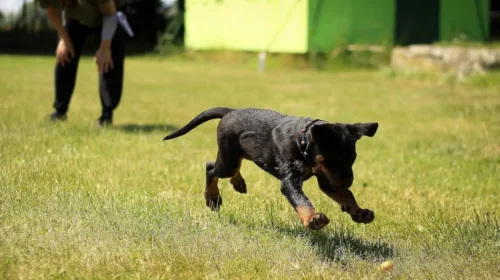Puppy development from 8 to 12 weeks
Most puppies move into their new homes between 8 and 12 weeks old, leaving behind their littermates, mothers, and infancy. This is the imprinting stage, in which many people choose to get their puppy. This is when the dog’s brain is developing rapidly and is ideal for training. The puppy is becoming a dog. During this crucial learning period, the puppy picks up their good and bad behaviours from their environment. This crucial puppy stage will show you how a pup behaves and its health and nutrition needs.
Physical Development
A puppy that is 8-12 weeks old will still be small, even if it is a large breed. Puppies can be physically fragile and clumsy. Puppies need a lot of care and supervision and create if left alone.
Everything You Need to Learn About Puppies
This stage is when your puppy will be sleeping a lot. Most puppies will sleep 18 to 20 hours per night to support their rapidly-growing brains. Puppy from 8-12 weeks may seem to be able to jump from 0 to 60 in a matter of minutes and then fall asleep within minutes.
Most puppies have difficulty controlling their urine and defecation before 12 weeks. Their tendency to have accidents is common, and they often need to urinate throughout the night. It would be best to start house training your puppy as soon as it arrives home. However, you should be ready for it to take a few weeks. You should stick to a schedule and take your puppy outside whenever it eats, drinks or wakes from a nap. Your puppy should go to the designated “potty area”. After a few weeks, it will begin to learn how to control its bodily functions.
Depending on the breed, your puppy will not develop adult teeth until 16 weeks old. It is possible for some of the puppy’s baby teeth, or “milk teeth”, to start to fall out between 8 and 12 weeks. Typically, signs of teething don’t appear until your dog is 12 weeks old. If your dog begins to drool, chew excessively, or paw at the mouth, you know that your dog is experiencing teething.
Behaviour Changes
Between 3 and 12 weeks is an important socialization period.1 Because puppies can seem afraid of everything, and this time is sometimes called a “fear phase”.
Practice handing your puppy to get it used to be held and touched in new ways
Your puppy will react to certain situations with fear. Avoid comforting or coddling a scared puppy. You can introduce your puppy to new sights, sounds and environments by finding ways to do so. Take your dog to the vet for nail trimmings and baths. Keep it positive.
Reward your puppy when it is relaxed in new situations or explores new things. Don’t force your puppy into accepting a scary situation. If you are calm and positive, your dog will soon learn that nothing is to be concerned about. As if it were a routine and regular situation.
Health and Care
Your puppy should visit the veterinarian between 6-8 weeks old to get its first vaccinations and deworming. A veterinarian should see your puppy within the first few days after being adopted. You should bring any records from the adoption group or breeder to your vet so they can adjust or prescribe a vaccination schedule.
The 18-week mark should administer all vaccinations. It would be best to prevent your puppy from being exposed to the disease. Your puppy should not be allowed to go into public places or interact with strangers. Play with healthy dogs and puppies that have been dewormed and vaccinated. It would be best if you got to know the owner of the other dog to be sure the dog is healthy.
Food and Nutrition
The average age when puppies are weaned from their mother’s milk is between 3 and 6 weeks old. They usually wean completely within 6 to 8 weeks. Your puppy should be eating puppy food at least for a few weeks before you give it to you. You should get information from the breeder or adopter about what kind of food your puppy is eating.
If possible, start with the same food. Give your puppy time to adapt to the new environment before changing to a portion of different food. To avoid any digestive upset, transition slowly to new foods if you decide to change the food.
Proper nutrition is essential for your puppy’s growth and development. You should provide high-quality puppy food that is labelled for growth. Three meals per day are recommended for puppies aged 8-12 weeks. In very small breeds, this regularity helps to prevent blood sugar drops.
Begin by giving your dog the recommended amount for his weight. To determine if your dog needs more food, check his daily weight. You can adjust the amount of food you give your dog if he is not eating enough. If your puppy is eating too much, you can reduce the food offered. Talk to your veterinarian about the food you’re feeding and how often you feed it. Also, what amount of food do you eat per day compared to the amount you ingest. If you have any questions, ask your doctor.
You can make homemade dog food. However, it is best to be careful as poor nutrition can lead to serious health problems. Discuss the idea with your vet. It is important to ensure that the recipe you choose is balanced and nutritious, uses the correct ingredients, and provides enough calories.
You can allow your puppy to eat a wide variety of treats, provided they are safe, non-toxic, and healthy.
Training
It doesn’t matter if your puppy is still a puppy. It’s important to begin training it as soon as you bring it home. Start small. Learn your puppy’s name. Give your dog time to learn the rules of the house. This includes where it can go and what is prohibited.
Before you attach a leash, let the dog get used to wearing a collar. You can then let the dog pull the leash until it is comfortable with it. Once the dog is comfortable with the leash, you can train it to walk on it.
Even though this is a fast learning period for your puppy, it may take some time before they become proficient at learning new things. Even basic commands such as sit, stay or down can be introduced. Take it slow, be patient, have fun, and keep it positive.




